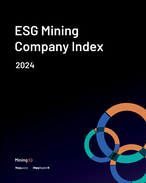As Canada seeks to drastically increase its output of 31 critical minerals, the government is also funding an infrastructure expansion to address the supply chain challenges the energy transition has faced.
The fund offers eligibility for up to C$50 million per project for non-governmental applicants and C$100 million for provincial and territorial governments. To qualify, projects must align with the fund's three criteria. Firstly, they must address gaps in clean energy and transportation infrastructure that limit the production and expansion of critical mineral resources in Canada.
Secondly, projects should drive emissions reductions in operations that produce critical minerals. This can be achieved by increasing access to and integration of renewable and non-emitting energy sources, such as solar, wind, and geothermal power, or by connecting to existing electrical grids.
Thirdly, the projects are expected to advance reconciliation with Indigenous Peoples. This involves supporting Indigenous consultation and participation, as well as ensuring benefits from infrastructure projects that enable critical minerals development. The overarching goal is to foster collaboration and mutual benefit with Indigenous communities.
The CMIF program is intended to last seven years and will include several Call for Proposal (CFP) rounds. Issued on November 20, 2023, applicants for the first CFP will access a collective pot of C$300M for projects in one of two streams: the Pre-construction and Project Development Stream and the Infrastructure Deployment Stream.
The first round proposal submission period ends on February 29, 2024.
"Critical minerals are a generational economic opportunity for Canada. As major enablers of clean technologies and clean energy sources, demand for critical minerals is projected to rise exponentially as the global economy continues to shift toward low-carbon solutions," said Jonathan Wilkinson, Minister of Energy and Natural Resources.
He continued: "Through the $1.5-billion Critical Minerals Infrastructure Fund, Canada will make strategic investments in projects to help enable and grow the sustainable development of these minerals, reinforcing Canada's position as a global supplier of choice for clean technology, clean energy and the resources the world needs to build a prosperous net-zero economy."
Larger strategy
First announced earlier this year, the C$1.5B is part of the country's larger C$3.8B critical minerals ambitions and was outlined in the 2022 Critical Minerals Strategy.
Since first announcing the funding schemes designed to bolster domestic metals exploration and production, battery manufacturing, and clean energy infrastructure, the government has dispersed millions in funding.
In June, The Mining Innovation Commercialization Accelerator Network (MICA), a government-funded group, awarded C$15M to 24 mining technology firms.
Some of the new innovations included a technology implementing transcritical CO2 pulverisation, another aimed at reducing carbon emissions during potash production and a firm working to expand autonomous driving for underground mines.
As the Critical Minerals Strategy outlines, Canada wants to expand and fortify its resource sector, which contributes 5% of the national GDP. The North American nation also wants to establish robust continental critical metal supply and value chains.
"Developing Canada's critical minerals value chains will not only boost the competitiveness of the minerals and metals sector, it will support the growth of our economy, support Canada's transition toward a net-zero economy and create well-paying jobs for Canadians," said François-Philippe Champagne, Minister of Innovation, Science and Industry.

























